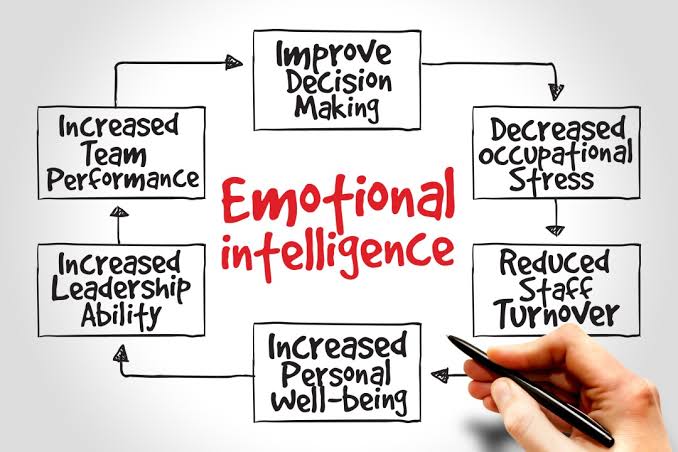Emotional Intelligence Quotient, or EQ, is the skill to understand, control, and express your emotions well, and also to recognize and react to others’ emotions correctly. Unlike Intelligence Quotient (IQ), which is about thinking skills, EQ is about how we relate to others. As of 2025, emotional intelligence is seen as very important for success at work, good leadership, and strong personal relationships.
In an increasingly complex and emotionally charged world, people with high EQ are better equipped to navigate social dynamics, handle stress, resolve conflicts, and collaborate across diverse teams. Emotional intelligence empowers individuals to remain composed during pressure, empathize with colleagues, and foster healthy environments both in the workplace and beyond.
Key Components of Emotional Intelligence
According to psychologists like Daniel Goleman, emotional intelligence is built around five core components. Each plays a vital role in shaping how individuals perceive and respond to the world around them.
- Self-awareness – This is the foundation of emotional intelligence. It involves recognizing your own emotions and how they affect your thoughts and behavior. People who are self-aware are better able to manage their reactions and understand their triggers.
- Self-regulation – This refers to the ability to control impulsive feelings and behaviors. It includes staying calm under pressure, being adaptable, and managing conflict without losing control or composure.
- Motivation – Emotionally intelligent people are often driven by internal goals rather than external rewards. They remain optimistic even in the face of setbacks and strive to improve themselves.
- Empathy – Perhaps the most socially valuable component, empathy is the ability to understand the emotions of others. This skill helps build trust, improve communication, and foster inclusive environments.
- Social skills – High EQ individuals tend to have strong communication and relationship-management abilities. They know how to build rapport, inspire others, and work as part of a team.
Each of these areas contributes to a more balanced, competent, and human-centered approach to life and work.
Why EQ Matters More Than Ever in 2025
The digital transformation of the workplace has made emotional intelligence more critical than ever. With the rise of remote work, virtual communication, and global teams, the ability to read emotional cues through text or video calls has become essential. The absence of face-to-face interaction often requires deeper emotional sensitivity to maintain effective collaboration and avoid miscommunication.
Moreover, as automation and artificial intelligence take over many routine tasks, uniquely human skills like empathy, persuasion, and conflict resolution have become competitive advantages. High EQ is now considered a core competency in fields ranging from healthcare and customer service to tech and management.
In leadership, EQ is no longer a bonus—it’s a requirement. Leaders who can connect with their teams on an emotional level inspire greater loyalty, performance, and innovation. Organizations across Canada and beyond are investing in EQ training for this very reason.
The Role of EQ in Personal Relationships
Beyond the workplace, emotional intelligence plays a crucial role in maintaining healthy personal relationships. Whether it’s in family life, friendships, or romantic partnerships, EQ helps individuals communicate clearly, manage disagreements, and show genuine care for others.
People with high EQ are more likely to:
- Express their feelings honestly but respectfully.
- Listen actively and validate others’ perspectives.
- Manage conflict in constructive ways.
- Recognize when someone is emotionally overwhelmed and respond with support.
These abilities build trust and deepen emotional bonds, leading to more fulfilling and resilient relationships.
Practical Ways to Improve Your EQ
Unlike IQ, emotional intelligence is not fixed. It can be developed through conscious effort and consistent practice. Here are practical strategies to enhance your EQ:
- Practice mindfulness – Paying attention to your thoughts and feelings helps improve self-awareness. Journaling or meditating daily can help track emotional patterns.
- Learn to pause – When faced with strong emotions, take a moment before reacting. This pause can help you respond more rationally and empathetically.
- Ask for feedback – Others often see what we miss. Asking colleagues, friends, or mentors how you handle emotions can reveal blind spots and growth areas.
- Engage in active listening – Make a conscious effort to understand not just what people say, but how they feel when they say it. Avoid interrupting and show genuine interest.
- Develop empathy – Try to see situations from others’ perspectives. Reading fiction or volunteering can expose you to different emotional realities.
- Manage stress proactively – Emotional regulation starts with understanding your stress triggers and having strategies to stay grounded, such as exercise, deep breathing, or taking breaks.
As these habits become second nature, your EQ will strengthen, positively impacting every aspect of your life.
EQ and Mental Health
Emotional intelligence is deeply connected to mental well-being. High EQ individuals are more in tune with their emotions, making it easier to identify when something is wrong and seek help. They are also more resilient in the face of adversity, using emotional regulation to cope with anxiety, depression, or personal setbacks.
Building emotional intelligence can:
- Reduce stress levels.
- Improve mood regulation.
- Increase feelings of self-worth.
- Strengthen your support system through better communication.
In essence, EQ acts as a buffer against the emotional strains of modern life, making it an invaluable tool for mental health maintenance.
Conclusion
Emotional intelligence is far more than a soft skill—it’s a life skill. In a time where emotional resilience, empathy, and interpersonal skills are in high demand, developing a high EQ can set you apart personally and professionally. It leads to deeper relationships, better job performance, stronger leadership, and improved mental health.
Unlike intelligence or technical knowledge, EQ is entirely within your control to improve. With self-awareness, empathy, and continuous learning, anyone can cultivate emotional intelligence and thrive in today’s emotionally complex world.



